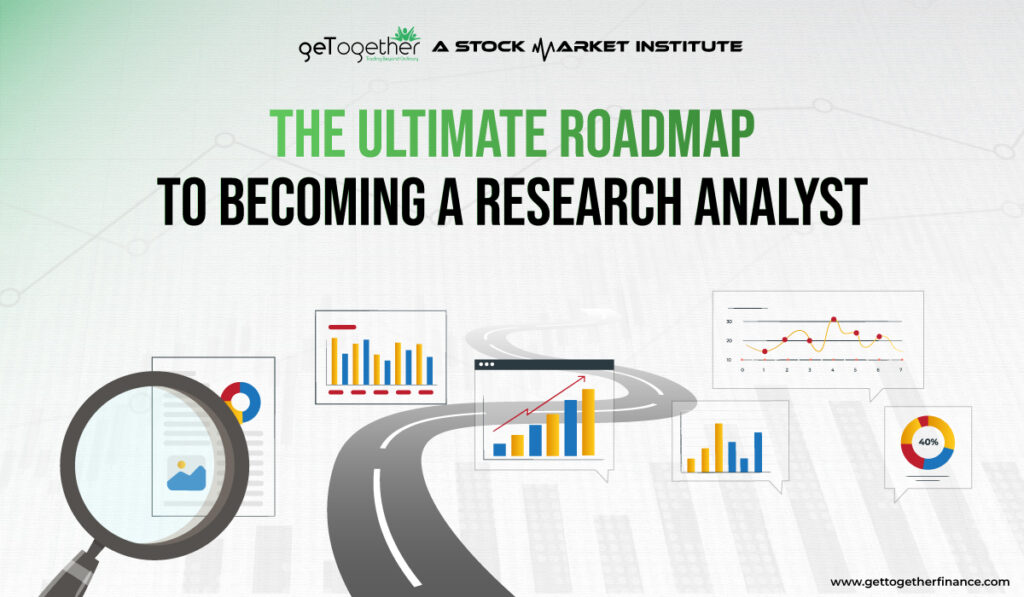The Ultimate Roadmap to Becoming a Research Analyst


Starting a career as a research analyst isn’t just about getting a finance or economics degree—though that’s a good start. The real challenge is figuring out where you want to go next. Research analysis is a specialised field that combines your education with sharp analytical skills and a solid grasp of financial markets.
In this article, we’ll break down the steps you need to take to become a research analyst, covering the key skills, qualifications, and opportunities that can help you build a stable and successful career in this exciting area.
Table of Contents
ToggleWhat is a Research Analyst?

A research analyst is a professional who studies and analyzes data to help businesses and investors make informed decisions. They gather information from various sources, such as financial reports, market trends, and economic data, and then interpret this information to give insights or suggestions. In layman’s terms, it is an expert who study finances and market data of businesses or investors to make strategic financial choices.
Research analysts typically work in fields like finance, economics, or marketing. In finance, for example, they might review stocks, bonds, or other investments to guide investors on where to put their money. They use their analytical skills to predict future trends, assess risks, and assess the performance of companies or industries are doing.
Types of Research Analysts

Typically, research analysts work in the financial sector, including banks, insurance companies, private equity, and asset management firms. But their expertise is also valuable in other industries, such as healthcare, manufacturing, marketing, aviation, public policy, technology, and government, among others.
Here are some common types:
Equity Research Analyst
The expertise of an equity analyst focuses on studying stocks. Think of them as stock detectives. They look at companies and their financial health to give advice on whether to buy, hold, or sell certain stocks.
Credit Research Analyst
Looks at how likely it is that companies or governments will pay back their debts. They analyse bonds and other loans, advising whether an investment is likely to be paid back without trouble.
Market Research Analyst
Ever wonder why certain products seem to be everywhere? The job of these analysts is to study consumer behavior, market trends, and competition. Their work helps companies decide what products to create and how to market them effectively.
Also Read: How to earn money in the stock market
Economic Research Analyst
Just like the weatherman, they study economic trends, like inflation or employment rates. They use this data to check what’s coming next in the economy and provide advice to businesses or governments.
Quantitative Research Analyst
These experts uses math and statistics to analyze data, often creating complex models. Quantitative analysts (or “quants”) use complex mathematical models to analyze market data, often helping to develop high-tech trading strategies.
Fixed Income Research Analyst
The Bond Exprts – Not 007! They specialise in bonds and other fixed income investments. They focus on securities that pay a fixed return, like bonds, and provide advice based on interest rates, credit risk, and economic conditions.
Industry Research Analyst
If you want to know what’s happening in a specific industry, like tech or healthcare, these are the people to ask. They keep a close eye on industry trends and companies, offering insights that help investors and businesses make smart moves.
Why to become Research Analyst?

If you’re into understanding market trends and love solving financial puzzles, becoming a research analyst could be a great move. It’s a role where you get to dig deep into data, guide investment decisions, and keep learning as the market evolves. Plus, it opens doors to higher roles in finance and can be pretty rewarding financially. If this still isn’t enough to pursue it as a career, here are few more benefits it offers as a career:
Lots of Options
As a research analyst, you can work in all sorts of fields—finance, marketing, healthcare, and more. This means you can pick an area that really interests you!
Good Job Prospects
There’s a growing need for this profession because companies want to make smart, data-driven decisions. So, you’ll likely have plenty of job opportunities.
Awsome Pay with Great Portfolio
Besides having a great portfolio, as analysts you can usually earn a solid salary. And as you gain experience, your paycheck can get even better.
Keep Your Brain Busy
If you love solving puzzles and diving into data, this job is perfect for you. You’ll always be learning new things and tackling interesting challenges.
Room to Grow
There are great chances to move up in your career. You could start as an analyst and eventually become a senior analyst or even a manager, taking on more responsibility.
Flexible Work
Depending on where you work, you might have some flexibility in your hours or even the option to work from home. Who doesn’t love a little work-life balance?
Valuable Skills
You’ll pick up a bunch of useful skills like data analysis, critical thinking, and communication. These skills can help you in many different jobs down the line.
How to Become a Research Analyst?

As a research analyst, you need to have strong math and stats skills, plus a solid grasp of how businesses and consumers tick. This combination comes from a mix of education, hands-on experience, and a good understanding of your industry.
Here is a step-by-step guide on what you will need to become a successful research analyst:
Get the Right Education
The first step is to earn a bachelor’s degree in a relevant field like finance, economics, statistics, mathematics, or business administration. Some of the most suitable courses include:
- B.Sc. (Mathematics)
- B.Com (Statistics & Mathematics)
- B.Sc. (Statistics)
- BBA (Marketing & Finance)
Here are some suitable master’s degrees for a career as a research analyst:
- M.Sc. (Statistics)
- M.A. (Economics)
- MBA (Business Administration)
- M.Sc. (Data Science)
- M.Sc. (Business Analytics)
- M.A. (Market Research)
- M.A. (Psychology)
- M.A. (Sociology)
It is important to aim for a strong academic record, as many employers prefer candidates with high grades. According to Zippia, 70% of research analysts have a bachelor’s degree, and 18% earn a master’s degree.
Build Important Skills
As a research analyst, you will need certain skills to do your job well. Focus on developing:
- Data Analysis Skills: Learn how to use software like Excel, SPSS, or R to analyze data.
- Financial Knowledge: Understand financial statements and how to create financial models.
- Communication Skills: Be able to write reports and present your findings clearly.
- Critical Thinking: Learn to think logically and solve problems effectively.
You can improve these skills through internships, projects, or online courses.
Gain Relevant Experience
Look for entry-level jobs like Junior Research Analyst or Data Analyst to get your foot in the door. Internships are also a great way to build your portfolio and network in the industry. As you progress, you can specialize in areas like financial research, market research, or operations research.
Get Certifications
While not always mandatory, certifications can give you an edge in the job market. Some popular certifications for research analysts include:
- NISM-Series-XV: Research Analyst Certification
- Chartered Financial Analyst (CFA)
- Financial Risk Manager (FRM)
These certifications shows your expertise and commitment to the profession.
Start Your Career
Once you have all the necessary qualifications and experience, you can begin your career as a research analyst.
Some of the top employers in India include:
- Investment banks like ICICI Securities, Kotak Securities, and Motilal Oswal
- Consulting firms like McKinsey, Bain & Company, and Boston Consulting Group
- Market research firms like Nielsen, Kantar, and Ipsos
- Financial services companies like Fidelity, BlackRock, and Franklin Templeton
Key Professional Skills for A Research Analysts
It’s not a piece of math quiz that you need to solve in this job, but to become a successful research analyst, you need to ace a set of professional and technical skills.
Here is a list of technical skills required for a successful research analyst:
- Research
- Financial modeling & analysis
- Data analysis
- Industry analysis
- Math and statistics
- Data visualization
- Consumer psychology
- Forecasting
- Business acumen
- Business productivity software
Here are a list of key professional skills:
- Critical Thinking
- Communication
- Attention to Detail
- Problem-Solving
- Project Management
- Adaptability
- Team Collaboration
The average salary for research analysts in India ranges from ₹3,00,000 to ₹7,00,000 per year, based on experience and specialisation, however, the talent is not restrained within the boundaries of money.
Research Analyst Career Path

Here is a concise overview of the typical successful research analyst career path:
Entry-Level Positions
Here are the entry level jobs and their key roles and responsibilities:
- Junior Research Analyst: Assists senior analysts in data collection, preliminary analysis, and report preparation. They learn analytical tools and methodologies.
- Data Analyst: Focuses on manipulating and analyzing data sets to support business decisions. It requires strong technical skills in data management and analysis software.
Mid-Level Positions
Here let’s take a look at the jobs and required skills:
- Research Analyst: With experience, takes on more complex projects, develops specialised knowledge, and leads entire research projects.
- Senior Research Analyst: Leads research projects, manages junior analysts, and provides key insights for decision-making. Often has deep expertise in specific industries or analysis types.
Advanced Positions
Here are a few advanced position jobs and required skills:
- Lead Analyst/Research Manager: Oversees the research department, sets goals and strategies, and ensures output quality. They interact with senior management.
- Director of Research: Offers strategic oversight, allocates resources, and integrates research findings into organizational strategy. It may influence policy based on insights.
Transitioning Roles
If not a research analyst, there are a few transitioning roles you can switch to with the specific set of skills and responsibilities:
- Executive Management: With proven experience, some analysts can move into executive roles like CIO or CSO to shape company strategy using data-driven insights.
- Teaching and Academia: Some can choose to share their knowledge through teaching at universities or engaging in academic research.
You can also opt for specialised roles in the finance sector such as consultant, methodology exper, and industry specialist. Advancing in this field typically requires a mix of education, skills, experience, and certifications like the Chartered Financial Analyst (CFA).
In A Nutshell
To wrap up, becoming a research analyst is a journey that combines education, technical expertise, and practical experience. However, the knowledge does not limit you to academic or professional sectors but expands your expertise in one of the most important aspect of everyday life, finance.
With the increasing buzz in the finance world and the growing sector of wealth management firms, the potential future in the sector is endless. Remember to stay engaged with industry trends and seek hands-on experience to enhance your career prospects. With the right preparation, you’ll be well-equipped to thrive in this dynamic and impactful field.0.
FAQs
What qualifications do I need to become a research analyst?
A bachelor’s degree in finance, economics, or a related field is typically required; a master’s degree can be beneficial.
What industries can research analysts work in?
Basically every business need the oversight of these analysts, hence you can work in many sectors, including finance, healthcare, technology, marketing, and many other.
Is certification necessary to become a research analyst?
While not always needed, certifications like the CFA (Chartered Financial Analyst) can enhance your credentials and job prospects.
Can I work remotely as a research analyst?
Yes, many research analyst roles offer the flexibility to work remotely, especially with advances in technology.
What is the difference between a research analyst and a data analyst?
Research analysts focus more on financial and market data to guide investment decisions, while data analysts may work across various data types and industries.



 Facebook
Facebook Instagram
Instagram Youtube
Youtube
